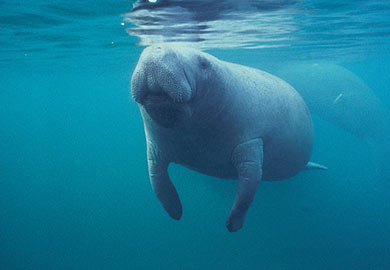DNR News
** Archived Article - please check for current information. **
June 1, 2015Feeding, watering manatees is illegal
Manatees have begun returning to their summer haunts along the coast of South Carolina, which means the S.C. Department of Natural Resources (DNR) is again reminding boaters to be on the lookout to avoid collisions with the endangered animals. Feeding and watering manatees is illegal and encourages them to spend time at docks and marinas, making them susceptible to boat strikes, one of the main causes of mortality for manatees. Enforcement efforts to prevent the feeding/watering of manatees will be enhanced in South Carolina.
“People may not realize that by watering a manatee, they are habituating that animal to a marina or dock, and therefore boats,” said DNR veterinarian Al Segars. “Essentially, they are baiting that animal into a very dangerous zone.”
With an estimated population of only 3,000 animals in U.S. waters, manatees, also known as sea cows, are protected as an endangered species under federal and South Carolina law. Dangers to the species include boat strikes, entanglement in fishing gear and harmful algal blooms known as red tides.
Although Florida manatees are present throughout the year in Florida, they are migratory in South Carolina. Manatees begin their slow migration up the South Carolina coast each spring when water temperatures rise into the upper 60s. They can be found in tidal rivers, estuaries and nearshore marine waters throughout Georgia and the Carolinas throughout the summer months. Manatees return to Florida in September and October as the water temperature cools.
Adult manatees are about 10 feet long and weigh up to one ton. Their skin varies from gray to brown, and their bodies are rounded with two pectoral flippers and a wide, flat tail. Subsisting on marsh grass and other aquatic plants, the animals are gentle and pose no threat to humans. It is illegal to hunt, play with or harass manatees; this includes touching, watering or attempting to feed them.
Manatees have a slow reproductive rate. Females are not sexually mature until about 5 years old, and males mature at about 9 years of age. On average, an adult female gives birth to one calf every two to five years, and twins are rare. The gestation period is about a year.
Mothers nurse their young for one to two years, so a calf may remain dependent on its mother during that time. Manatee calves are about 4 feet long at birth and about 60 pounds.
The number of manatees along South Carolina’s coastline each year is unknown because the turbid, murky waters near the coast make surveys difficult. South Carolina residents can help biologists learn more about the movements and habitat use of manatees by reporting any sightings and taking photographs.
Collisions between boaters and manatees are more likely to occur in shallow waters, particularly around docks and at the edge of marshes where manatees feed. Following boater safety regulations in these areas can reduce the risk of a collision. Boaters should also watch for manatee backs, tails, snouts and "footprints"—a series of round swirls on the surface caused by a swimming manatee’s tail.
If a boat accidentally collides with a manatee, the S.C. Department of Natural Resources (DNR) asks that the boater stand-by and immediately contact the U.S. Coast Guard on VHF Channel 16 or DNR at (800) 922-5431. Doing so provides biologists the best chance to help the animal and gather valuable scientific data.
Report a healthy, live manatee. Please note the date, time, location and number of manatees seen, as well as the coordinates, if possible. Photographs of scars on their backs and tails are especially useful because they can often be used to identify previously known manatees.
Report an injured or dead manatee by calling the DNR Hotline at 1-800-922-5431.
Here are some other ways South Carolina residents can help protect manatees:
* Look around for manatees before cranking your boat’s motor.
* Use caution when navigating in shallow water and along the edge of a marsh. Manatees cannot dive away from boats in these areas.
* Please heed "slow speed," "no wake" and manatee warning signs, especially around docks.
* Wear polarized sunglasses to reduce glare, making it easier to spot manatees below the surface.
* Watch for large swirls in the water, called footprints, that may be caused by manatees diving away from the boat.
* Dock owners should never feed manatees or give them fresh water. This could teach the animals to approach docks, putting them at greater risk of a boat strike, and it is illegal.
* Never pursue, harass or play with manatees. It is bad for the manatees and is illegal.
More News
- Renew your state hunting and fishing license
- Coyote workshop planned for Fairfield Co. on June 9
- Feeding, watering manatees is illegal
- Commercial shrimp trawling season opened May 27
- June 15 deadline to apply for 2014 public alligator hunting, special WMA season
- Hummingbirds returning to South Carolina
- DNR offering virtual hands on boating safety classes in July
- 2014 S.C. Environmental Awareness Award call for nominations
- DNR dedicates memorial plaque to fallen officer
- Spawning season for a “Living Fossil”
- Statewide deer harvest decreases in 2014
- DNR offers guidelines for dealing with bears; report a sighting on website
- Loggerhead nest kicks off sea turtle season
- Laws are strict on taking wild turkey eggs and releasing pen-raised turkeys
- DNR hosts series of youth fishing rodeos/family fishing clinics around the state
- Freshwater fishing trends
- Saltwater fishing trends
- S.C. weekly tidetable
- DNR video
- Archived news releases
